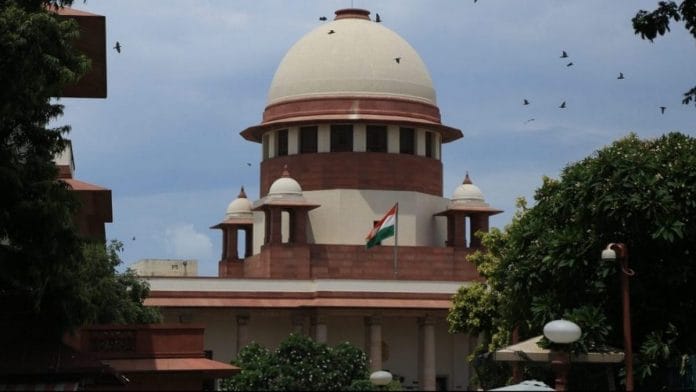New Delhi: The Supreme Court Thursday said the government should have put the decision of the special committee, constituted on the court’s directive, to not resume 4G internet in Jammu and Kashmir in the public domain.
The court was hearing a contempt petition that sought action against government officials for allegedly defying the court’s order to form the committee.
A special bench led by Justice N.V. Ramana told the central government’s counsel Attorney General K.K. Venugopal, “If you have complied with the orders given in May, then it is needed to be published in public domain.”
On 11 May, the top court had directed the government to constitute a high-powered committee to look into the issue of restoring 4G internet services in J&K. The committee was tasked to determine the necessity of continued restriction of mobile internet speed to only 2G bandwidth there.
While declining to order restoration of 4G services, the court had said that a “special committee,” which is separate from the “review committee” prescribed under the Temporary Telecom Suspension Rules 2017, was necessary.
However, a contempt petition filed by the Foundation for Media Professionals claims that no such committee was formed, 29 days after the order was issued.
The bench gave the government and the union territory administration a week’s time to file its response to the contempt petition. It, however, refrained from issuing a formal notice to the central government, as pressed by the petitioner’s counsel.
Also read: SC refuses to entertain plea challenging 100% J&K domicile reservation in public employment
No contempt made out: Central government
Venugopal refuted the petitioner’s allegations and said, “There is no question of contempt.” According to him, the committee was constituted and had also taken the decision to continue with 2G services.
The same will be placed before the bench in a sealed cover, he told the bench.
“Please consider it and see if we have not complied. Please see and post the matter after two months,” the top law officer said.
However, the judges were quick to point out that the details of the committee were not in the public domain.
“But nothing is in public domain,” said Justice Ramana.
Venugopal also noted that numerous incidences of terrorist activity has forced the government to continue with the status quo of 2G internet services in J&K.
This was disputed by the petitioner who cited Home Minister Amit Shah’s statement on 31 May, where he said the terrorist incidents were at the lowest in the Valley since 1991.
Also read: Jammu & Kashmir didn’t observe Martyrs’ Day as state holiday today — first time since 1948
No response to our representations: Petitioner
Senior advocate Huzefa Ahmadi, appearing for the petitioner, argued that the purpose of the Supreme Court order was to grant a hearing to the representations made against suspension of 4G services.
However, none of the representations have received any government response.
“The idea was not to form a committee, pass orders and keep it in a drawer. The SC judgement required the committee to review the ban every week and publish their decision, bringing it in public eye. How can we challenge the decision if we are unaware of it?” he submitted to the bench.
He added that people in J&K were suffering due to lack of 4G internet services.
“People continue to suffer. Medical facilities continue to suffer. Children cannot take online classes. What the entire country enjoys, only J&K cannot. This directly infringes Article 21 (right to life and liberty),” Ahmadi said.
Also read: Is Kashmir militancy beginning to ebb? Last decade trend shows it could be another false dawn







Restore the 4G internet speed in j and k.
4G internet is nothing to do with militancy , actiually the high profile officers are just giving excuses that without 4G internet , the militancy can be stoped … It’s non sense.
Kabi restore nahi hoga ye bas hamay dekhanay ke liye karte hai ye sab kuch taki hamay lage ki unko hamare parwa hai . Agle saal be hum isse phir se charcha Kar rahe honge ….
restore#4g internet